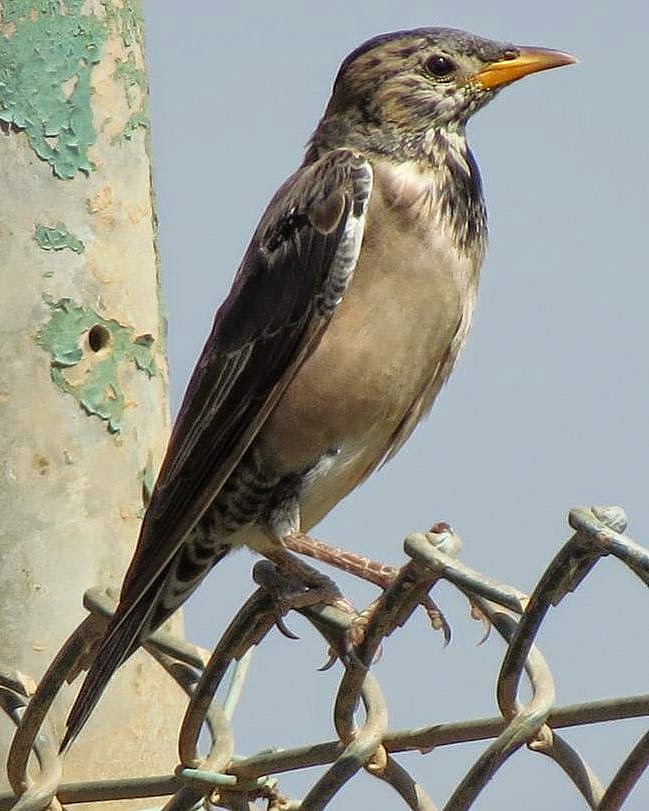There was no watering in this part of the farm and a pivot bar on which so many birds were perched last time had been moved. Nevertheless it still had some interesting birds in this section.
The common myna had mostly moved on but I saw two more rosy starling, one of which wasn't one of those like seen last time.
two rosy starling
I suspect rosy starling will prove not to be very rare at the farm in winter.
first rosy starling
.
second rosy starling
Namaqua dove
I have only seen them close to the farm and the adjacent Wadi Sawnout and at Ayn Hamran, nowhere else.
female house sparrow
The house sparrow is even rarer in the city area. They appear to be only by this farm and the remains of Jarziz farm (as it closes down). They shun houses just like Spanish sparrow and desert sparrow.
Eastern Imperial eagle
I got closer views of the Eastern Imperial eagle but there was no sign of the yellow billed kite from last visit. I also couldn't see any of the expected sociable lapwing which have been wintering on Salalah's two (now one) farms. I am now quite happy for someone else to spot them first. I have all winter to see them.
underside of eastern Imperial eagle
After leaving the farm, the plan was to go searching for the elusive golden-winged grosbeck up at Wadi Hanna which is past Tawi Atair. the plan didn't work out exactly which I will explain as I go along.
I headed up the hills until I arrived at the plateau just before the small town of Tawi Atair. I was tempted to deviate off the main road to the left to look at a green-looking wadi off- the-beaten-track.
Arabian partridge
very young cinnamon breasted bunting
The place was thronging with cinnamon-breasted bunting. One confiding one was very young. This is the first time I had seen one of this age still with a yellow gape.
second view of juvenile cinnamon-breasted bunting
They are attractive at this age with more cinnamon suffusions than in adult birds.
African paradise flycatcher
The wadi even had some standing water and was very shady in parts. I was not surprised to see an African paradise flycatcher.
Long-billed pipit
As I left the wadi and walking back towards the car, I came across a tame long-billed pipit.
underside of short toed eagle
After this wadi, I drove straight through Tawi Atair and up into Wadi Hanna which is beautiful wooded highland area. I stopped quickly just as I arrived at the start of the wadi as I heard fan-tailed raven screaming. This is often a sign that they are mobbing a bird of prey. Sure enough two of them were mobbing a short toed eagle.
upperside of short toed eagle
However my primary purpose in visiting Wadi Hanna was to search for golden-winged grosbeck, the elusive Arabian endemic.
euphorbia in Wadi Hanna
It is known to be particularly attracted to euphorbia. Furthermore many of its sightings have been at Ayn Hamaran and at Wadi Hanna.
A friend in Saudi Arabia (Lou Regenmorter) has circulated a picture of a euphorbia found near a recent sighting of them south of Taif, Saudi Arabia. I found large tracts of the same euphorbia to the east of the main woodland at the top of Ayn Hamran and in two places in the large wadi Hanna.
However the euphorbia at Ayn Hmaran had died back but may come back in another season. While the euphorbia at the more elevated Wadi Hanna looked like it was two months short of coming into fruit (and then berry).
Further correspondence has suggested they feed on other plants too such as prickly pear but I haven't any prickly pear in the mountains near Salalah.
I have since read an excellent article on euphorbia in Dhofar and discovered there are at least 8 types, fruiting at different times and looking quite different from each other. I suspect the grosbeck rotate around those in fruit and berries.
Meanwhile, when I was in the euphorbia grove and having just seen a pair of Arabian warbler, I again heard the fan-tailed raven screaming. I rushed out into an open space to see my first Eurasian sparrowhawk since being in Oman.
Eurasian sparrowhawk
This continued to be the pattern of my birding: in the woodland until I heard fan tailed raven then out into the clearings to see what they were up to.
Eurasian sparrowhawk flying off
On another occasion, it was a steppe eagle that got mobbed.
Fan-tailed raven mobbing a steppe eagle
Finally as it came towards dusk, four eagles appeared around the same time. This time the fan-tailed raven did not respond. Perhaps the numbers were too great for them or they were more interested in roosting.
steppe eagle
The two steppe eagle and two Eastern Imperial eagle flew around unhindered.
Eastern Imperial eagle
It was a strange day. I went out looking for golden-winged grosbeck but ended up with plenty of sightings of birds of prey.
On Saturday I went out north into the desert. I'll blog about that next.




















.JPG)
Very nice. Just wondering why you haven't caught up with Verraux's Eagle yet. Where are they seen?
ReplyDeleteAndy, I have been to all the right places including Wadi Hanna, Ayn Hamran and Wadi Darbat. One day It will happen. It just a question of time and I have that. Rob
ReplyDeleteIt's certainly not for want of trying!
ReplyDelete